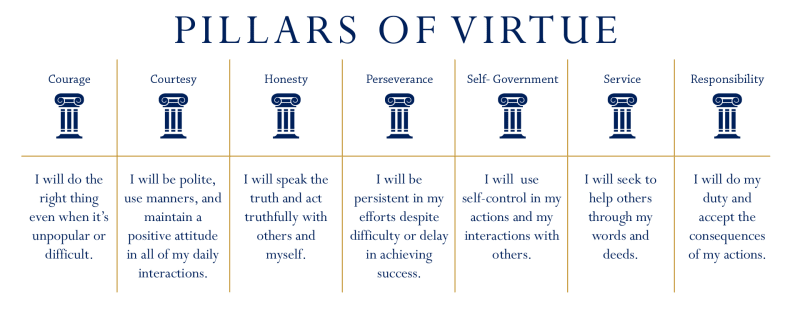By Dr. Dan Sturdevant

Honesty“I am not bound to win, but I am bound to be true. I am not bound tosucceed, but I am bound to live up to what light I have.” – Abraham Lincoln
Hello Parents, Scholars, Friends, and Optima Family!
As we continue our series of virtue posts – reflecting the 7 pillars of virtue we strive to instill at Optima Classical Academy – we have arrived at our study of honesty. I’ll admit that it may be a bit on the nose to have a quote from “Honest” Abe Lincoln at the top, but there really are few, if any, more deserving options for inspiration of a discussion around honesty, in all its facets.
Abraham Lincoln is one of our most celebrated Presidents, and deservedly so for his exceptional character and resolve, but I believe he actually does not receive enough celebration. Specifically, I don’t believe that Lincoln is thought of enough as an author, leader, and friend among his other excellent qualities. For example, a reading of the speeches he wrote and delivered in his time as President will reveal exquisitely crafted, accessible, and logical appeals to reason, to “the better angels of our nature,” and to virtue. Below is a passage from Lincoln’s inaugural address, given as the Union was fracturing and preparing for civil war.
“I am loath to close. We are not enemies, but friends. We must not be enemies. Though passion may have strained it must not break our bonds of affection. The mystic chords of memory, stretching from every battlefield and patriot grave to every living heart and hearthstone all over this broad land, will yet swell the chorus of the Union, when again touched, as surely they will be, by the better angels of our nature.”Abraham Lincoln, January 1861
Lincoln is calling upon the memory of Patriot sacrifice, the “mystic” ties we have in shared memory and experiences that result in the highest of virtues – friendship. True friendship as we all know, must be honest. If your friends cannot or will not be honest with you, then it may be time to evaluate those relationships in earnest. Again, Lincoln was a sparkling example of this in both his personal and professional life. Personally, he had a close circle of friends in Springfield, Illinois who he relied upon for guidance and encouragement, and who he trusted to send as his emissaries to important political functions as well as social engagements.
Professionally, Lincoln was uncommonly aware of how easily a President can surround himself with “yes men” who will only give the Commander-in-Chief the advice he wants to hear, rather than the advice he needs. In fact, Lincoln was so concerned with honest feedback and input, that he chose several of his most bitter political rivals to be his cabinet members – his “Team of Rivals” as Doris Kearns Goodwin so aptly named it. Unsurprisingly, by the time Lincoln was killed just over 4 years later, the men in his cabinet were – to a man – devoted friends, loyal and honest at all times. Reflective of the quote at the top of this post, Lincoln was not out to win all arguments, discussions, etc, but to live up to the virtue of honesty.
There are many lessons we can take from Abraham Lincoln, and many of you, like me, I am sure, learned of his honesty as a student. I distinctly remember a story about Lincoln accidentally ruining a book that a neighbor lent him, owning up to the error, and then working off the value (which was considerable in the Illinois frontier in the early 1800s). However, if we stop there, at just the strength of character that Lincoln displayed as our only measure of his honesty, we miss a rich opportunity. Lincoln valued intellectual honesty – even, (and as president especially) when it differed with his own thoughts or ideas. If we are to prepare our scholars for excellence in life, we must do the same.
Honesty as a virtue is, and must be first and foremost a commitment to telling the truth in word and deed, but it can and should also be an invitation to a fuller definition of the word, where distinct and differing ideas, observations, and ideologies are engaged respectfully, considered, and welcomed. Lincoln didn’t always change his mind when his cabinet presented him with alternatives, but he never dismissed them out of hand, and for that virtue, they grew to love him.
Thank you for reading, and as always, please reach out to info@optimaclassical.org with your questions.
Warmly,
Dr. Dan Sturdevant
Head of School



